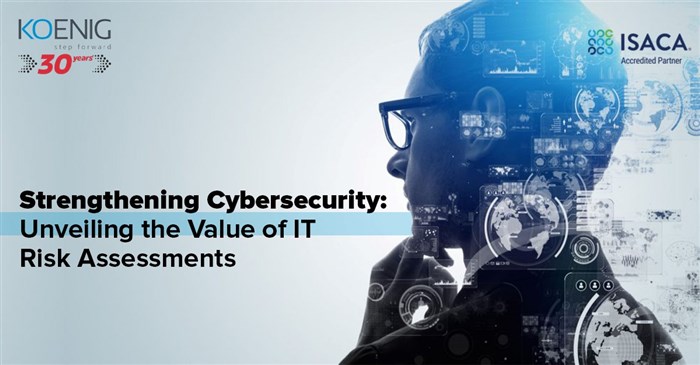Unable to find what you're searching for?
We're here to help you find it
In the ever-evolving digital landscape, cybersecurity has become an utmost priority for organizations worldwide. The rising sophistication of cyber threats calls for robust strategies that can safeguard sensitive data, intellectual property, and business operations. Among the arsenal of cybersecurity measures, IT risk assessments stand out as a crucial tool in identifying, prioritizing, and mitigating potential vulnerabilities. In this article, we will delve into the significance of IT risk assessments and how they can play a pivotal role in fortifying an organization's cybersecurity posture. As we explore this topic, we will emphasize the role of ISACA training in empowering tech professionals to excel in the field of cybersecurity.
The Growing Cyber Threat Landscape:
The exponential growth of digital connectivity and the internet has given rise to a vast array of cyber threats. Cyberattacks are no longer limited to a few script kiddies; instead, they are orchestrated by sophisticated and well-funded threat actors, ranging from hackers to state-sponsored groups. Here are some eye-opening statistics that highlight the gravity of the cybersecurity challenge:
The Importance of IT Risk Assessments:
Amidst these alarming statistics, IT risk assessments emerge as a powerful defense mechanism that can significantly enhance an organization's cybersecurity resilience. A comprehensive risk assessment provides the following benefits:
Identifying Vulnerabilities: IT risk assessments help identify potential weaknesses in an organization's IT infrastructure, applications, and processes. This includes identifying outdated software, unpatched systems, misconfigured firewalls, and other security gaps that could be exploited by malicious actors.
Prioritizing Security Measures: Not all risks are equal, and IT risk assessments enable organizations to prioritize their cybersecurity efforts. This ensures that resources are allocated efficiently to address the most critical vulnerabilities first.
Regulatory Compliance: Many industries are subject to strict data protection and privacy regulations. IT risk assessments assist in ensuring compliance with these regulations, minimizing the risk of hefty fines and legal repercussions.
Cost-Effective Solutions: By understanding the potential risks, organizations can invest in cybersecurity solutions that are tailored to their specific needs, avoiding unnecessary expenditures on generic and less effective security measures.
Proactive Cybersecurity: Regular IT risk assessments promote a proactive cybersecurity culture, enabling organizations to stay one step ahead of emerging threats and cybercriminal tactics.
ISACA Training: Empowering Cybersecurity Professionals:
As technology continues to advance, cybersecurity professionals must equip themselves with the latest knowledge and skills to combat evolving cyber threats effectively. The Information Systems Audit and Control Association (ISACA) offers specialized training programs that cater to the unique demands of the cybersecurity domain. These training programs enable tech professionals to:
Master Risk Assessment Techniques: ISACA training equips professionals with in-depth knowledge of risk assessment methodologies, enabling them to conduct comprehensive and accurate evaluations of an organization's cybersecurity posture.
Understand Industry Best Practices: ISACA training courses incorporate the latest industry best practices, standards, and frameworks, such as COBIT and NIST, ensuring that professionals are well-versed in globally accepted cybersecurity approaches.
Stay Abreast of Emerging Threats: Cyber threats are constantly evolving, and ISACA training keeps professionals updated with the latest threat intelligence and attack vectors, helping them devise effective countermeasures.
Build Cross-Functional Skills: ISACA training goes beyond technical aspects and emphasizes the importance of communication, leadership, and collaboration skills, enabling cybersecurity professionals to work seamlessly with other departments in an organization.
Conclusion:
In the face of an ever-expanding cyber threat landscape, IT risk assessments play a pivotal role in strengthening an organization's cybersecurity defenses. By identifying vulnerabilities, prioritizing security measures, and ensuring regulatory compliance, risk assessments pave the way for a proactive cybersecurity approach. Moreover, ISACA training empowers tech professionals with the knowledge and skills needed to excel in this challenging field. As tech professionals continue to elevate their expertise through ISACA training, organizations can fortify their cybersecurity posture and stay ahead in the perpetual battle against cyber threats. Remember, in the world of cybersecurity, knowledge and preparedness are the ultimate keys to success.

Archer Charles has top education industry knowledge with 4 years of experience. Being a passionate blogger also does blogging on the technology niche.










